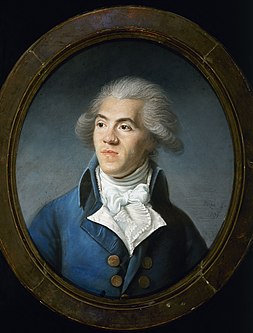
Antoine Pierre Joseph Marie Barnave was a French politician, and, together with Honoré Mirabeau, one of the most influential orators of the early part of the French Revolution. He is most notable for correspondence with Marie Antoinette in an attempt to set up a constitutional monarchy and for being one of the founding members of the Feuillants.
Jean-François Reubell or Rewbell was a French lawyer, diplomat, and politician of the Revolution.

The Society of the Friends of the Constitution, after 1792 renamed Society of the Jacobins, Friends of Freedom and Equality, commonly known as the Jacobin Club or simply the Jacobins, became the most influential political club during the French Revolution of 1789 and following. The period of their political ascendency is known as the Reign of Terror, during which time tens of thousands were put on trial and executed in France, many for political crimes.
The Girondins, Girondists or Gironde were members of a loosely knit political faction during the French Revolution.
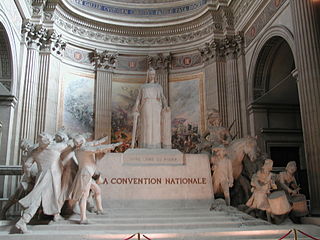
The National Convention was the first government of the French Revolution, following the two-year National Constituent Assembly and the one-year Legislative Assembly. Created after the great insurrection of 10 August 1792, it was the first French government organized as a republic, abandoning the monarchy altogether. The Convention sat as a single-chamber assembly from 20 September 1792 to 26 October 1795.

The Mountain was a political group during the French Revolution, whose members called the Montagnards sat on the highest benches in the National Assembly.

Jean-Lambert Tallien was a French political figure of the revolutionary period.

The French Revolution was a period in the history of France covering the years 1789 to 1799, in which republicans overthrew the Bourbon monarchy and the Roman Catholic Church in France perforce underwent radical restructuring. This article covers the one-year period from 1 October 1791 to September 1792, during which France was governed by the Legislative Assembly, operating under the French Constitution of 1791, between the periods of the National Constituent Assembly and of the National Convention.

Jean-Baptiste Louvet de Couvrai was a French novelist, playwright, journalist, politician, and diplomat.
This is a glossary of the French Revolution. It generally does not explicate names of individual people or their political associations; those can be found in List of people associated with the French Revolution.

Gilbert Romme was a French politician and mathematician who developed the French Republican Calendar.

Isaac René Guy Le Chapelier was a French jurist and politician of the Revolutionary period.
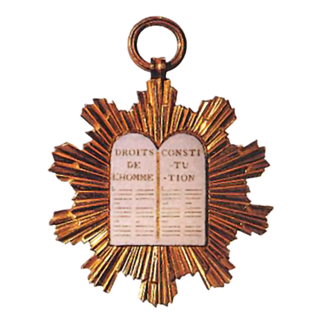
The Legislative Assembly was the legislature of France from 1 October 1791 to 20 September 1792 during the years of the French Revolution. It provided the focus of political debate and revolutionary law-making between the periods of the National Constituent Assembly and of the National Convention.

Jacques Claude, comte de Beugnot was a French politician before, during, and after the French Revolution. His son Auguste Arthur Beugnot was an historian and scholar.
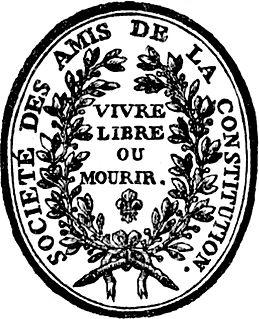
The Society of the Friends of the Constitution, better known as Feuillants Club, was a political grouping that emerged during the French Revolution. It came into existence on 16 July 1791 when the left-wing Jacobins split between moderates (Feuillants), who sought to preserve the position of the king and supported the proposed plan of the National Constituent Assembly for a constitutional monarchy; and radicals (Jacobins), who wished to press for a continuation of direct democratic action to overthrow Louis XVI. It represented the last and most vigorous attempt of the moderate constitutional monarchists to steer the course of the revolution away from the radical Jacobins.

The French National Convention election elected the National Convention.
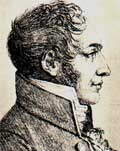
Jacques-Alexis Thuriot, known as Thuriot de la Rosière, and later as chevalier Thuriot de la Rosière, chevalier de l'Empire was an important French statesman of the French Revolution, and a minor figure under the French Empire of Napoleon Bonaparte.
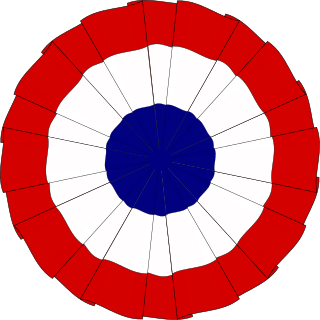
The Society of 1789, or the Patriotic Society of 1789, was a political club of the French Revolution inaugurated during a festive banquet held at Palais-Royal in May 1790 by more moderate elements of the Club Breton. At their height of influence, it was the second most important club after the Jacobin Club.


















